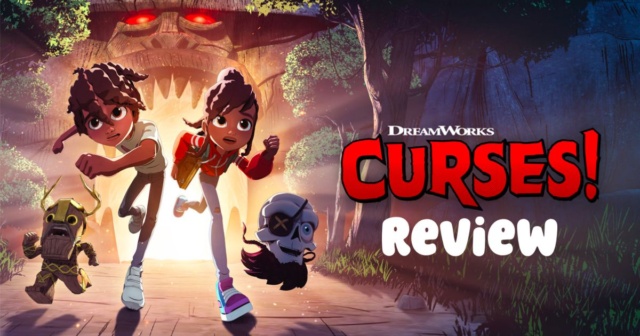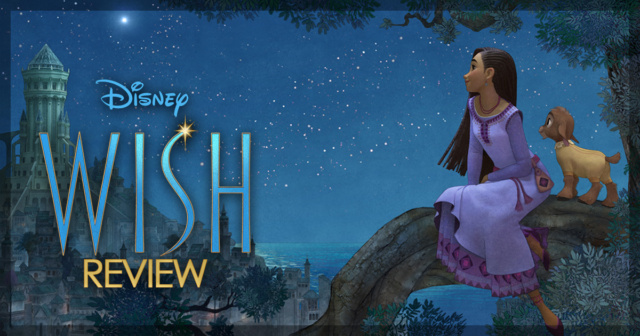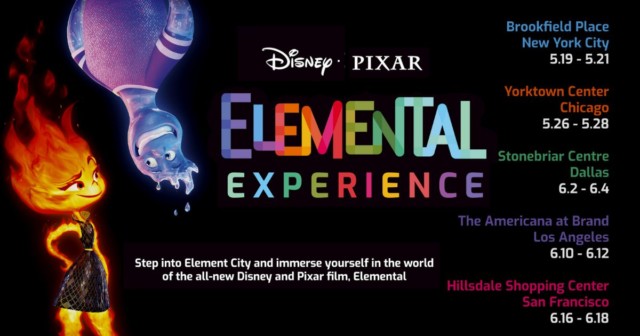Interview: ‘CURSES!’ with Jim Cooper, Jeff Dixon & Leo Riley
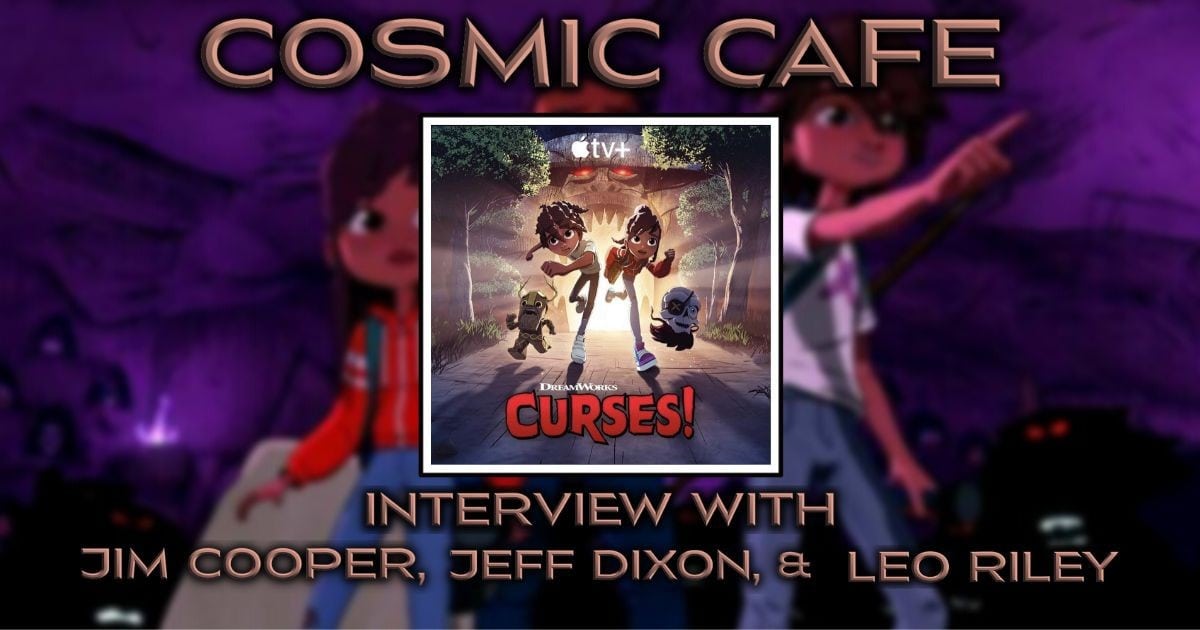
Have you ever wondered if your family is cursed? Apple TV+’s CURSES! is a family animated show that explores the idea of what if a family was cursed because of an artifact-stealing Great Great Great Grandfather. In the pilot, the kids Pandora (Gabrielle Nevaeh), Russ (Andre Robinson), and Sky (Lyric Lewis) in the family Vanderhouven learn that their dad has been keeping a secret from them about their family’s past.
It’s a ton of fun with age-appropriate awesome scares, adventure, a treasure trove of secrets, and oh so many ancient artifacts. One of the best parts about CURSES! is that the whole family can watch together. We recently had the chance to sit down over Zoom to talk with creators Jeff Dixon and Jim Cooper, and director Leo Riley to talk about the series.
The interview with CURSES! team Jim Cooper, Jeff Dixon, & Leo Riley
[Editor’s note: This interview has been lightly edited for clarity.]
Ayla Ruby: Well, it’s lovely to meet you all. I’m I’m Ayla Ruby.
Jim Cooper: Hey.
Ayla Ruby: Okay, so first I have a daughter that’s seven, and this show is right in her space, so it’s really cute. I love it. Thank you for that. Thank you for just making a really cool show for kids.
Jim Cooper: Oh, thank you for saying that.
Ayla Ruby: Yeah, no, I loved it. She loves it too. She’s downstairs. Hopefully won’t crash this, but yeah, I have a lot of questions. I’m really curious about, so Jeff and Jim, about your partnership, I know it started on the playground in essentially elementary school.
Jim Cooper: Literally, yeah.
On how they tested a writing partnership by working on a feature
Ayla Ruby: Yes. For your kids. Can you talk about, so after you have this kernel of an idea from the playground, when do you know it’s go time? How do you approach that? What was the kind of development process for the program like after you have your idea and figure out this is what you want?
Jeff Dixon: Well, what’s funny is the first part of the process, I think, for us was to make sure that we could actually write together. Because we had never actually written as a team before, and we’ve always just had our own individual careers. We actually, the first go, the first, “Hey, can we do this,” we actually did a feature script together, which was kind of our, can we do this experiment? It worked really well, and it was a balance of horror and comedy, and it was this four-quadrant thing and we’re like, “Hey, this can actually work.” That was kind of, I think, our very first test case just to see. Then from there, we actually started going, “Oh, this could actually work. What is something that we would really,” so that was, I think, we don’t really discuss even that much because it was like you don’t think about it. You always just think Curses!, Curses!, Curses!.
But, there was this test case that made sure we could write together. What we discovered, a lot of it was just, we have a lot of strengths. I don’t want to say weaknesses, but things that either of us are just a little stronger at, whether it be structure, or character, or dialogue, or whatever, that we started to find that person’s strengths, or that we would really start to find who would lean into that, who would lean into that. I would write some of the more scary scenes. He would write a little bit more of the history explanation scenes. We would find that balance through our writing as well. I don’t know if that fully answered your question, but Coop take off from that.
On coming up with ideas on hikes, and the evolution of CURSES!
Jim Cooper: I mean, in all honesty, a lot of it, and I joke this is completely true, a lot of it was talking through on hikes we would do together. I mean, you’d literally hike and you got to talk about something if you’re walking five miles, you know what I mean? We would talk about different things, and it’s like, okay, kernel of an idea, family gets cursed. Okay, what do you do, and like that. It was interesting, should it be live-action? We talked about it live-action for a while, and then someone’s like that, “You could never make that show, because that would be too expensive.” They’re like, “Put it on the shelf for a while.” Got the idea, what if we did it animated? It’s funny, it really evolved a lot over the years. That in itself is kind of fascinating. It would almost be a long essay to explain, okay, we thought about it this way and then this way.
Jeff Dixon: What I do love though is, where we’ve landed in a spot where we’ll throw ideas out to each other all the time, whether it is story ideas, or series ideas, or episode ideas, or whatever. Well, how about this? How about that? How about that? There’ll be a lot of, maybe, maybe, but then there’ll be that moment of just like, that’s it that’s it. That’s it moment, and so we know that we wait for the, that’s it moments. Because if there’s a lot of those, maybes, you just know subconsciously that’s not the best one, but we do definitely have that moment.
Jim Cooper: One of my favorite moments there is, so Pandora is the name of Jeff’s sister.
Ayla Ruby: Oh!
Jim Cooper: We’re literally on a hike and he’s talking about my sister Pandora, and I’m like, “Were your parents aware of the story of Pandora when they named her?” “No, they weren’t.” I’m like, “Dude, that’s a great character name,” so it’s kind of funny where I don’t think he necessarily would’ve gone, let’s name a character after my sister. But you’re going, dude, no, that’s it right there.
On how Leo Riley connected on CURSES!
Ayla Ruby: Oh, that’s awesome. Leo, how did you connect with them and get onto the project? Because, you have more of an animation background, right? An animation directing background?
Leo Riley: Correct. Yeah, I think I was rolling off of a project that was an action project here at the studio at Dreamworks, and I was brought in by development. It’s one of those things, I think, I’m trying to think about the projects I’ve worked on, and it seems like every project that you hope to work on is the project that you’re maybe not currently working on. Right? Stylistically, I come off an action show and I was like, yeah, I could work on another action show, but I’d really like to do something different.
Ayla Ruby: Yep.
Leo Riley: When they said, “Oh, we’ve got this gateway horror show that would you be interested,” and I was like, “Absolutely.” I think that’s how that came about really was initially that. I was doing some, when they were early in development, I was doing some storyboards and just helping out and bouncing around on projects and development. This one seemed to be the one that just had legs and just went. Yeah, that’s how, I guess, I got involved.
Jim Cooper: Well, and by the way, it’s interesting too, because some storyboards had been done before Leo jumped on board, and when he came on board, there were a couple moments where Jeff and I were like, whoa, what’s it like new revised things? It was like you knew the minute, because Leo understood the language of horror. There were shots and scenes that you’re going, okay, that’s it right there. It was very exciting, because it was just something that we could recognize instantly without Leo even having to say anything. It was there in the drawings.
On mild scares helping kids through their fears
Ayla Ruby: That’s awesome. That’s kind of a great way into, so one of the things that’s appealing about the show, you guys have talked about gateway horror and scaring people, and it seems to be part of this larger philosophy that scares are good. I would love for you guys to just talk about that and expand on that a little bit more, because I think it’s such a cool thing.
Jeff Dixon: You broke up just for a second. You said a larger philosophy of, and then it-
Ayla Ruby: That scares are essentially, mild scares are a good thing for kids, because it helps them overcome their fears, and be brave, and deal, and work through things, which I think you see a lot of in the show.
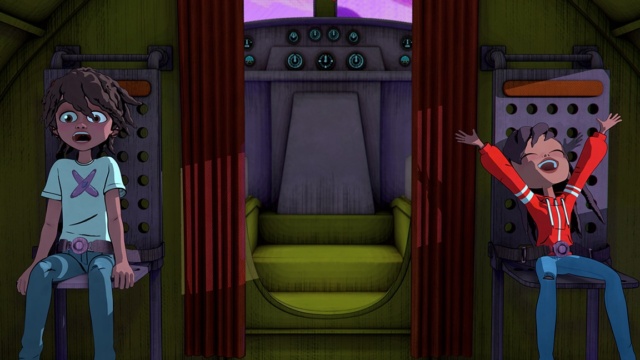
Jeff Dixon: Oh, absolutely. That was something that was just very personal, near and dear to me, just because that was kind of what I kind of went through as a kid myself. I think for me, it was just really about, I tried to test myself a lot as a kid, and sometimes watching things I should not have been watching, but I still tried. This is a way to do that, that they should be watching. You know what I mean? It’s like this is the one, the safe way of doing, accomplishing the exact same thing.
But yeah, I mean, we’ve talked about how the show definitely means something a little different to every person, whether it is a theme here, or a moral there, or different aspects. I know that both Leo and Coop probably have, this is what that’s most important to me here. This is what is most important to me here. For me, honestly, it’s exactly what you were talking about. I really do believe in building courage through a little bit of pushing yourself beyond some boundaries that maybe you wouldn’t normally do. The characters try to do it in a few of the points, and we tried to do it with the show.
Ayla Ruby: Well, then I’ll raise the question then to both Leo and Jim, or Coop as you say. Can you talk about what’s the thing for you in the show that really sticks out along the lines of what Jeff said?
Jim Cooper: Well, for me it has been the idea of viewing things differently. It’s funny, we were talking about the nature of a curse. The nature of a curse is someone or something was wronged, and to end the curse, how do you make it right? I’ve always thought it was really fascinating. You really kind of have to get on the level of the thing or figure out the curse and go, what’s truly at the heart of the matter? The reason why the family is successful is, because they view things differently than everyone else has in the past. You know what I mean? Rather than, the baboon head, well, the sensible thing would be lock it up and so it can’t bite you or whatever. They’re like, “Well, no, what’s it after? What’s the matter,” and solving that. To me, that’s kind of the fascinating thing, and that’s kind of true really for any decent story. You’re like, “What am I not seeing here? How can I look at things different?” That’s what I’m always fascinated by.
Leo Riley: I think, I’m trying to remember the original question, but I wrote down a couple of things really quickly just so I hope it makes sense. I hope that-
Ayla Ruby: It’ll be good.
Leo Riley: Okay. I think for me, working on the show, a lot of it has just been finding a balance, right, of being able, how far can we push it without being too scary, without, and being thoughtful about our approach to the storytelling. Pushing the scares, and yet, yeah, just trying to be clever about how you offset that with either color palette, or levity, or just, again, just finding ways to, sorry, I just totally lost my train of thought.
Ayla Ruby: No, that’s totally fine.
Leo Riley: But then also, I think also having chances to pay homage to the things that really inspired me and that I love about the genre, and yet doing it in a way that’s accessible without being, again, too in the realm of what Jeff was talking about, the stuff that you weren’t supposed to see. This is the beginning of that.
On comic relief and naming Stanley and Larry in CURSES!
Ayla Ruby: Okay, cool. I know we’re running close on time, but I really wanted to ask about this. Stanley and Larry, a lot of comic relief obviously since, and they’re kind of like emissaries for the family through the world since dad is cursed. One, are they named after anyone special? Because I had some, I don’t know, I was just wondering if it was an Easter egg, and two, can you talk about the approach to those characters and how you saw them and what they brought to the world?
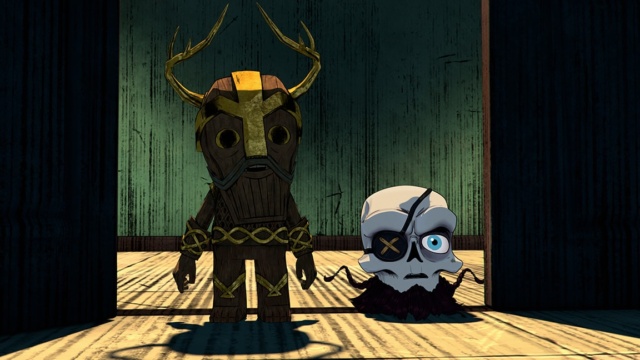
Jeff Dixon: Well, I will say this, I will let Coop take the part that I know he wants to say. But, the one thing-
Jim Cooper: I’m not hundred percent sure I know what it is.
Jeff Dixon: The one thing I will say about Stanley and Larry is, a lot of people have asked us, “Oh, did you base them on C3PO and R2D2?” The answer is, no, we did not. But, the one thing that we did kind of base a little bit of them on is Coop and I. Because we actually, they’re very, very, very exaggerated versions of essentially the way we react to things. I can sometimes be the Larry and he can sometimes be the Stanley, and so we definitely used a little bit of that in there. As far as the names go, that’s what I was going to say, Coop, I think.
Jim Cooper: Well, it’s funny, this is going to sound totally nerdy, obscure, but the Stanley, I think, I can’t even exactly remember, but I always think it like Stanley and Livingstone, the Dr. Livingstone, I presume.
Ayla Ruby: Yeah.
Jim Cooper: That’s sort of like-
Ayla Ruby: Wasn’t he in, there was a skull, right? No, with doctor, and then I totally confused the stories with Dr. Livingstone. No, never mind.
Jim Cooper: No, they were just explorers. But, then there was also Laurel and Hardy. We kind of pictured them being like, and then to be perfectly honest, Larry was originally called Jerry, just because we thought that was funny.
Ayla Ruby: Okay.
Jim Cooper: Legal’s like, “We can’t call him Jerry,” and we’re like, “Why,” and they’re like, “There’s another skull out there named Jerry,” and we’re like, “Seriously? How about Larry?” “Larry’s fine,” and we’re like, “Woo hoo. Larry it is.” We have a friend named Larry too.
Jeff Dixon: Yeah, we have a friend named Larry, so he loves it.
Jim Cooper: You’re like, “It’s not named after you, but we were well aware.” No, I’m intrigued. What is your thoughts, and maybe we-
Ayla Ruby: I was totally wondering if it was Stanley was named after Stanley Kubrick. I couldn’t figure out Larry at all.
Jim Cooper: Oh, no.
Ayla Ruby: But, that was my thought. I’m like, okay, maybe because there’s some Shining references in CURSES!.
Jeff Dixon: Glad you saw those.
Jim Cooper: This is absolutely true.
Jeff Dixon: I was just going to say, when I said that what I thought you wanted say was the Stanley and Livingstone thing.
Jim Cooper: Yeah, and by the way, can I tell you, I mean, you know how memory works, I think that’s where we threw it out.
Jeff Dixon: It is.
On naming grandpa Vanderhouven
Jim Cooper: Literally sometimes, but I can tell you Cornelius Vanderhouven, that name came up because when we were on one of our hikes, we were talking about the grandpa, and I started saying, Cornelius Vanderbilt. Midway through we’re like, “Well, it can’t be Vanderbilt.” I’m like, “Cornelius, Vanderhouven,” and Jeff laughed, and we’re like, Vanderhouven it is. That was the extent of that, where you’re like, it is Cornelius Vanderbilt, but we want to make it sound a little funnier. It’s funny, sometimes I genuinely don’t remember, although then we’re like, “Okay, it’s Pan.” Okay, I’ll be quiet now.
Ayla Ruby: That’s a story you can’t tell.
Jim Cooper: No, me being verbose.
Leo Riley: Yeah, he’ll go, so I’d say from an outside perspective, I think this exaggeration that you guys think that you’re experiencing, is not quite as exaggerated as you think it is.
Jim Cooper: We also did the scratch voices for them when, sometimes you just need scratch voices because you’ve changed the line and the actors haven’t recorded yet. I’d be Stanley and Jeff would be Larry, by the way, worst experience ever to then have to be in the room when the real actor has to fill in the thing and your voice is in there, and you just, you’re like, okay, yeah, I suck. I’m not a good actor.
On getting voice talent like Robert Englund and James Marsters
Ayla Ruby: You guys had amazing actors too, right? You had the voice of Freddy Krueger (Robert Englund), you had Spike from Buffy (James Marsters), you had your main cast. How did they come on board? What was that like? Because, as a horror person, that’s amazing.
Jeff Dixon: It’s a combination, honestly, of the amazing casting department of Dreamworks. They really would be like, “Two things. Number one, who are some people you think?” We’re like, “Can we shoot for the sky?” They’re like, “Shoot for the sky.” We would throw names and then they would compile lists that would have some of those names that we wanted, and then a whole bunch of names that we never thought of and be like, “Whoa, that was a stroke of genius.” Yeah, there’s some names, I mean, I won’t say which or which, whatever, but there’s some names that they were our first choice and we got, and then there’s some other ones where it’s like, “Oh my gosh, we would’ve never thought, but they are perfect.”
Ayla Ruby: Yep.
Jeff Dixon: It was really, we were really lucky that all of them took to the material really well. Every one of them has just, everybody in our cast has just been absolutely incredible. I’m glad the SAG strike’s over so they can actually talk about the show.
On a final takeaway about CURSES!
Ayla Ruby: Yes. My last, and I’m getting the message we have to be done in a moment. Is there anything you want folks to know about versus is there anything that you want to leave people with for all of you?
Jeff Dixon: Honestly, what I, this is going to sound so dumb and it’s going to sound very like, hey, but just tell your friends about it. We just need to get the word out about the show. We want everybody to see it. We’re so freaking proud of the show, and we just really want as many people as possible to see it and watch it.
Jim Cooper: Yeah, and honestly, we made it for the whole family. Our intention is kids watch it, the parents watch it. There’s going to be a lot of stuff, and I don’t mean like, “Ooh, it’s ribald humor,” or something like the adults will understand that the kids. I mean, I think thematically and some of the thoughts and some of the background, I mean, I think a lot of adults will be like, “Oh wow, they’re really dealing with some interesting issues here.”
Ayla Ruby: Yeah.
Jeff Dixon: Leo, you go, but then I want to say one more thing. I don’t want to interrupt.
Leo Riley: I don’t know how to follow up that, what you guys were just talking about. I guess I would just say that, please check out the show. It was put together by some really, a group of really thoughtful, kind, talented people who just really tried to put everything they had up on screen, so yeah.
Jeff Dixon: I completely agree with that. The only thing I will add at the end, and it’s been one of my absolute favorite things that’s happened since the show came out is, we’ve been getting photos from people of their kids watching the show from 6, 7, 8, 9 years old. What’s so fun is, some of them are hiding halfway behind a blanket, some of them are kind of looking over here, and they send these photos to us, and everyone brings me so much joy, because they’re having fun with it. It’s not like they won’t sleep at night. They’re like, okay, another one, another one. They asked for another episode. But, it’s those moments of actually like, that experiencing that fear for kind of the first time. Because if you think about, a lot of these kids have never really experienced this, so this is a new sensation to them. Seeing those photos are the greatest thing in the world, so that’s what I would say is that, for parents out there with kids, watching your kids watch it is fabulous.
Jim Cooper: I just realized the photo is sort of the photo that you get and a rollercoaster during the dive, and everyone’s like that. They sell it afterward. You’re like, “Yeah, that’s it.” You want to see more of those.
Ayla Ruby: Oh, fantastic. Well, thank you all so much. I really appreciate the time.
CURSES! is now streaming on Apple TV+
You can tune in to CURSES! on Apple TV+. Have you checked this series out already? Let us know what you think about it or this interview on social media @mycosmiccircus or The Cosmic Circus Discord.
Curses! Review: Another Win for DreamWorks Animation
Review: Wish makes a sincere effort at tribute to Disney’s magical past

